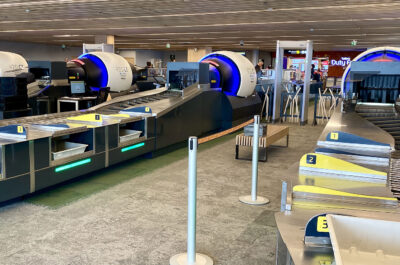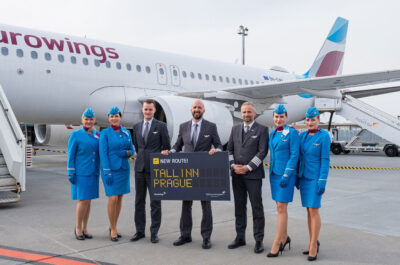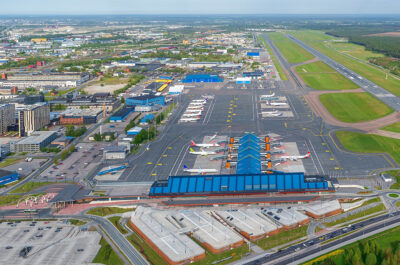
During the initial phase of the project, development of real estate specific to the aviation sector will take place on the southern side of the runway. An investment of 30 million euros has already been allocated to this area, with the completion of the first structures targeted for 2025.
Tallinn Airport has announced the establishment of a subsidiary company, AS Airport City, focusing on developing the airport’s real estate business. This move will make Tallinn a more attractive location for global aviation companies, thereby increasing corporate and national revenues from aviation support services and the added value created here.
Growing non-aviation revenue to safeguard the aviation business
“The unique challenges the last few years have thrown at the aviation business made us realise that we needed to turn even more attention to boosting our non-aeronautical revenue. If you become too reliant on aviation income, you will leave yourself vulnerable,” commented Riivo Tuvike, the CEO of Tallinn Airport. Tallinn airport is situated on the outskirts of Europe, a small population and enormous pressure from airlines mean that increasing earnings from aviation is limited.
Also read → 269,911 passengers passed through Tallinn Airport in June
Today, 71% of Tallinn Airport revenue comes from non-aeronautical sources, which has enabled speedy recovery from recent crises. Non-aeronautical revenue accounted for 36 million euros of our turnover in 2022. The exact figure in 2019 was 30 million euros (63% of revenue). The critical source of non-aeronautical revenue – the one Tallinn Airport is growing all the time – is real estate development. Airport City will be a hub for business development projects that are designed to create infrastructure, a business environment and support services with even better growth opportunities for aviation-related companies looking to operate at Tallinn Airport.
In the project’s first phase, aviation-related real estate will be developed on the runway’s south side, where 30 million euros have already been invested and the first buildings are due for completion in 2025. This area is big enough for further development of 179,000 m2.
In 2022 Tallinn Airport completed infrastructure investments which over the next 15 years will result in a six-fold increase in our commercial real estate, i.e. from 50,000 m2 to 300,000 m2. “With the successful implementation of our strategy, in 2033, real estate income will exceed earnings from aviation and non-aviation combined,” concluded Riivo Tuvike.
According to Riivo Tuvike, the airport’s CEO, the airport’s task is to connect Estonia to the world, and the development of clusters related to aviation companies around Tallinn Airport directly supports this. The main strength of the development project is its perfect location near the city centre and at the hub of the city’s most important transport corridors (roads, railways, air traffic). The airport’s passenger terminal is the centre of attraction for the entire region. The establishment of Airport City will provide unique facilities and services for the airport’s customers, including airlines, passengers, and partners.
“Tallinn Airport owns 80 ha of free land in Tallinn. This is a significant step towards Tallinn Airport’s goal of providing a more growth-ready infrastructure, business environment, and support services for aviation-related companies wishing to operate there. This development will positively impact the Estonian economy, creating new job opportunities and boosting economic growth,” said Tuvike.
Airport Cities, or airport business parks, are rapidly gaining momentum throughout Europe, targeting companies that require proximity to airports and passengers, runways, and aircraft. Commercial real estate will be divided into four districts, Nordway, Southroad, Eastfield, and Westgate, with the first phase of development set to begin at Southroad Airport. This phase will add 179,000 square meters of additional space, compared to the current 55,000 square meters of commercial space, and is expected to be completed in 2030. The area is suitable for companies operating in the MRO or logistical sector and considering proximity to city and transport corridors important for their businesses.
Tatiana is the news coordinator for TravelDailyNews Media Network (traveldailynews.gr, traveldailynews.com and traveldailynews.asia). Her role includes monitoring the hundreds of news sources of TravelDailyNews Media Network and skimming the most important according to our strategy.
She holds a Bachelor's degree in Communication & Mass Media from Panteion University of Political & Social Studies of Athens and she has been editor and editor-in-chief in various economic magazines and newspapers.




































































































































